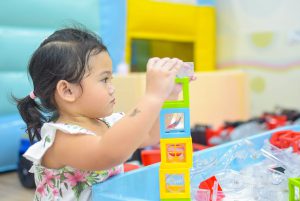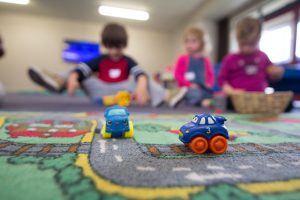5 Benefits of Childcare
Reasons for childcare are many. The visit for children in a kindergarten is not only about fun and games, but is especially important for their development. Children learn many things in kindergarten or daycare that will be important for the rest of their lives.
Many parents whose children are under three years old are faced with the question of whether their child should go to kindergarten. Especially the parents’ professional situation is often a reason children attend kindergarten. But parents often ask themselves many questions. Is it the right thing for the child or does he or she even feel pushed away? It is also often difficult – both for the parents and the child – to let go. With the right facility on your side, both children and parents benefit from professional childcare. We will explain the advantages now.
-
Children learn social behaviour
If the child previously only knew the confined family environment, it must now learn to deal with a completely new situation. There are usually 15-20 children in a group. Here they learn to fit in. Of course, quarrels and conflicts are to be expected. These must be endured or resolved. Often this happens without the help of the caregivers. In this way, the children develop a sense of interaction with others and learn about social life. This addition to the familiar family life is important for the emotional and intellectual development of your child.
-
Childcare promotes personality development
In their own family, every child usually has a fixed role. This is also important and gives the child stability and security in the first years of life. However, it is equally important that it also learns other roles and their place in a different social structure. Kindergarten provides this opportunity in a safe and supervised environment. Over time, the child takes on distinct roles, assumes responsibility and thus gains self-confidence. Games played with each other as well as under supervision are also important for this.
-
Learning from and with each other
In kindergarten, there are usually children from two different age groups in one group. Each child has different talents and abilities – in addition, their background and culture or religion may differ. These differences provide important stimuli for learning. Children do not necessarily learn consciously, but by observing, imitating, and repeating. In this way, each child learns from others and expands his or her own knowledge and skills as well as social skills, which often goes hand in hand with a good feeling.
-
Developing basic skills
In childcare, pedagogical support ensures that your child’s development is fostered in key areas. Perception, language as well as movement and coordination, thinking, emotionality and empathy are developed through play. Trained professionals provide impulses for learning and play behaviour and use educational materials, picture books, and play corners. In many kindergartens, field trips, e.g., to the zoo, are also on the schedule.

-
Recognition of unique features and needs
In kindergarten, specific features or even deficits in development are often noticed for the first time. During kindergarten, the teachers get to know each child well and can specifically address his or her talents, strengths, and weaknesses. In this way, professional help can also be sought early on – if necessary – so that the child is prepared for a good start to school.
Subsequently, childcare has various advantages for parents and children. Here is an overview:
Advantages for parents
- You can return to your job early
- Best compatibility of family and career
- You benefit from the exchange of experiences with other parents and educators (“door to door talks”, parent days)
- You gain more freedom for your own realization
- Continuous opening hours throughout the year give you more flexibility
- Regular feedback on the developmental status of your child
- Practical support in all educational, health and nutritional questions
Advantages for children
- Contact with other children and adults promotes social skills
- Children in the group develop better strategies for conflict resolution
- Kids also learn to build trusting relationships with caregivers outside the family
- A child who attends a childcare facility benefit from their “experience” in elementary school and have an advantage over their peers
- Your child experiences affirmation through friendships and relationships
- The concept of small group sizes facilitates the settling-in phase, especially introverted children feel secure in small groups.
- The interaction with, alongside and (sometimes) against each other in the group promotes empathy and assertiveness.
- Fixed rules and structures provide orientation


